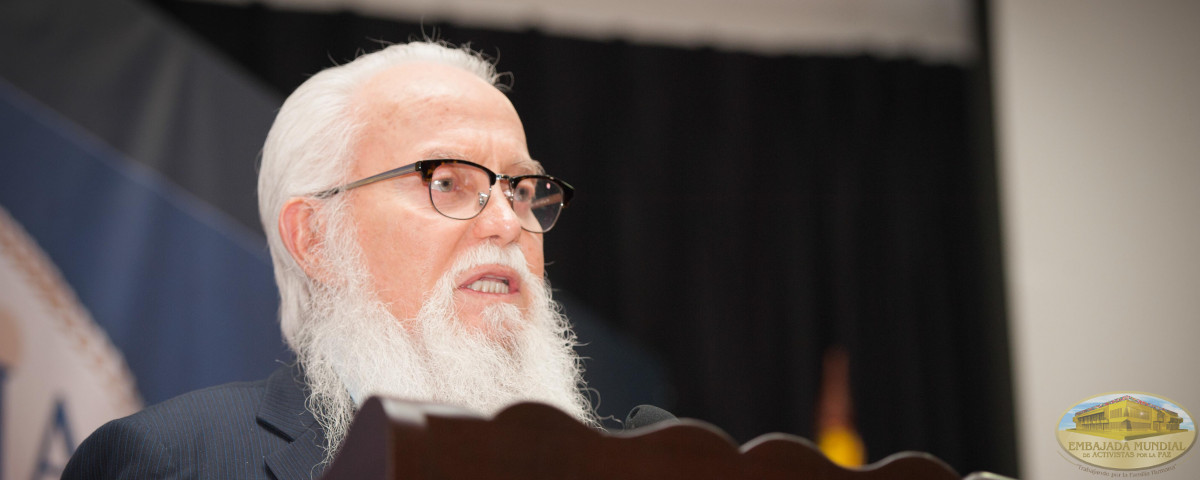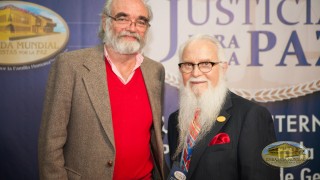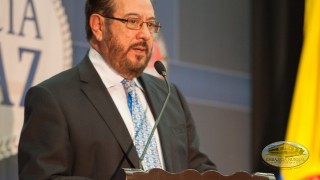Argentina, next host of the International Judicial Forums
Bogotá, D.C., Colombia, September 22, 2014
"The debate and the reflection on constructive criticism reflection is just beginning"
With these words, at 7:30 pm, Dr. William Soto, Ambassador of the Global Embassy of Activists Peace, officially closed the First International Judicial Forum that was celebrated on the premises of the Universidad Libre in Bogotá, on the topic: "New Proposals for the Prevention and Punishment of the Crime of Genocide."
For 12 hours, a massive attendance of over 1100 participants: university students, teachers, soldiers, historians, lawyers, journalists, indigenous communities, activists, among others, received the intellectual contributions of legal experts, judges and scholars from different countries in Latin America who spoke on the topic of the capital crime: genocide.
The next host of the International Judicial Forum will be the city of Buenos Aires, Argentina, during the month of November. Lawyers from different countries will meet in order to discuss and consolidate the "New Proposals for the Prevention and Punishment of the Crime of Genocide."
During the second part of the Forum, the speakers continued to intensify the proposals; and for his part, Dr. Constantino Riquelme, an expert writer of the criminal law in Panama, sustained the need to set the international standards in a "Convention on Human Responsibilities", in order to avoid impunity of individuals who commit offenses against humanity.
"If we do not start with ordinary constitutional jurisdictions of our countries, international law will be lost. We have to handle it in the complementary aspect because, I believe that otherwise the very essence of justice will be lost."
Dr. Jose Jesus Naveja Macias, President of the Confederation of Colleges and Mexico’s Bar Associations, also stated that putting in context the harmonious relationship that must exist between international and domestic law , and the consequences when this correspondence is unknown by the States, because if the international system is omitted, it would cease to effectively guarantee fundamental rights.
Dr. Marcelo Franco Fiumara, Judge at the Criminal Oral Court, was also present as part of the Argentinian delegation, who, referring to positivism in his lecture on the possibility of detecting the origin of Genocide, said:
"Every time you see a law that is unfair, think that this rule should be unconstitutional; what is fair is above the right. If right is used, it is the ideal field to prevent."
One of the issues raised by Dr. Soto Santiago and provoked great interest in the attendees was the need to define the crime of ecocide, which was integrated into the discussion by Ati Quigua, from the perspective of indigenous peoples (See link), and Dr. Luis Antonio Ortiz, Judge of the Supreme Court of Venezuela. This form of genocide is the systematic destruction of ecosystems, preventing life from being naturally created. Under this innovative premise and highly relevant to the world today, in pragmatic terms, Dr. Ortiz asked the Global Embassy of Activists for Peace to take to the proposed criminalization of ecocide as the fifth international crime against peace to the Assembly of the United Nations:
"I'm not the first person to speak or raise the issue of Ecocide. This topic has been extensively spoken about since 1970. I humbly come to emphasize and ask the citizen, Ambassador of Peace, that within your organization this big proposal is brought to the National Assembly, so that we can have the fifth offense pursued and condemned by International Human Rights."
Representing Colombia, the Vice President Judge of the Supreme Court of Justice, Dr. José Leonidas Bustos, explained that state sovereignty could not be an impediment to international intervention, he emphasized:
"It is important to assume as true that there will not be a place in this world where violators of rights violators can take refuge [...] this must be reflected in International Humanitarian Law."
To achieve this, he proposed the implementation in all countries of the international jurisdiction for crimes such as genocide, stating that "it would be interesting to think of regional and sub-regional systems of criminal justice," thus ensuring the proper practice of Human Rights.
Dr. Victor Manuel Nuñez Rodriguez, Minister of the Supreme Court of Justice of Paraguay, in his dissertation on the definition and legal interpretation applied to the crime of genocide in his country, said: "For the consummation of the crime of genocide, it is not necessary the actual destruction of the protected group as such (national, racial, ethnic and religious), just the intent to destroy the group."
The right protected by the crime of genocide is the group's existence as such, which Dr. Nunez believes that preserving the integrity of these groups are somehow protecting mankind; consequently, made the invitation to all countries of the world to include this offense, which cataloged atrocious in their domestic legislation.
To conclude the presentations at the Forum, Dr. Camilo Montoya Reyes, Attorney to the High Court of Bogotá, presented the findings of the event, emphasizing that "genocide has to transcend mere physical destruction." Emphasized the distinction between legality and legitimacy within regulatory systems:
"Many actions are legal, because we compared against a code and are who agree to such regulations [...] But to say that legal proceedings may be rendered unlawful when unfairly compromise the fundamental rights."
To close the event, participants had the opportunity to ask questions on several points of the subject; within which Prof. Dionisio Ortega, Rector of the University HiLo Paraguay, concerning the role of the Embassy of Peace Activists in relation to Education, asked: "How could establish a universal syllabus to study the Holocaust and what the Embassy is doing to help in the field of education? "
Lic. Francisco Guerra, Coordinator of Mexico laEmbajada World Peace Activists, said: "Education is a tool to create change. Our organization, through forums has performed in different countries (such as Mexico with 200 universities and thousands of students), has invited the general public to develop their educational programs based on universal principles and values. These projects are being promoted in other countries from kindergarten, high school, to high school and college. "
The next home of the International Judicial Forum will be in Buenos Aires, Argentina, during the month of November. Judges from different countries will meet with the purpose of debating and streghthening the "New Proposals for the Prevention and Punishment of the Crime of Genocide."


